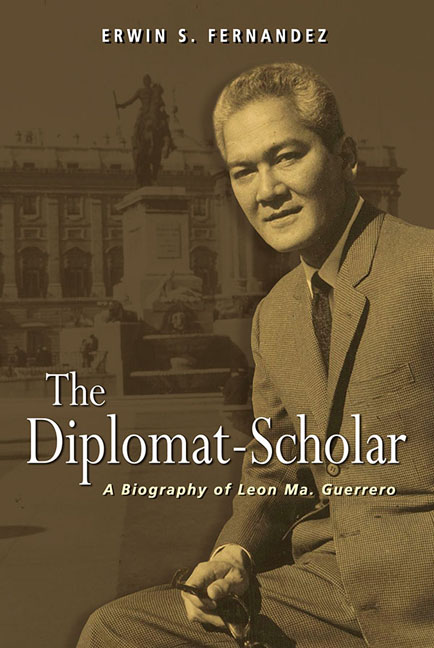Book contents
- Frontmatter
- Dedication
- Contents
- Preface
- Prologue
- Chronology
- I Ermita and Santa Cruz to Intramuros: Between Literary and Legal Career
- II To Tokyo and Back: The Making of a Diplomat
- III Going In, then Out of the Political Jungle: Padre Burgos to Arlegui
- IV London and Madrid: The Philippines in a Resurgent Asia
- 12 At the Court of Saint James
- 13 A Verbal Tussle in the UN
- 14 The Biographer
- 15 At Franco Country
- 16 In Search of the Burgos Trial Records
- 17 Home Leave in Preparation for a State Visit
- V New Delhi to Belgrade: The Philippines towards Non-Alignment
- Epilogue
- Glossary
- List of Abbreviations
- Bibliography
- Index
- About the Author
14 - The Biographer
from IV - London and Madrid: The Philippines in a Resurgent Asia
Published online by Cambridge University Press: 12 January 2018
- Frontmatter
- Dedication
- Contents
- Preface
- Prologue
- Chronology
- I Ermita and Santa Cruz to Intramuros: Between Literary and Legal Career
- II To Tokyo and Back: The Making of a Diplomat
- III Going In, then Out of the Political Jungle: Padre Burgos to Arlegui
- IV London and Madrid: The Philippines in a Resurgent Asia
- 12 At the Court of Saint James
- 13 A Verbal Tussle in the UN
- 14 The Biographer
- 15 At Franco Country
- 16 In Search of the Burgos Trial Records
- 17 Home Leave in Preparation for a State Visit
- V New Delhi to Belgrade: The Philippines towards Non-Alignment
- Epilogue
- Glossary
- List of Abbreviations
- Bibliography
- Index
- About the Author
Summary
Coming back from Africa, Guerrero devoted the rest of December 1959 to translating Noli Me Tangere (hereafter Noli) he finished on Rizal Day. The following year it was published by Longmans. He agreed to the offer of David Medalla, a rising Filipino artist who had just arrived in London, to draw its cover design. As soon as he was done with Noli, he worked on El Filibusterismo (hereafter Fili). Before Longmans published Noli, he sold the rights to the Manila Times for publication in instalments. What speeded up his translation was the deadline set by the publisher. “I always like to write against a deadline, because I'm very lazy,” he admitted. Thus he did finish translating Noli and then Fili. The catch to selling his rights to the daily of Noli was the exclusion or omission from publication the debate on purgatory between philosopher Tasio and Don Filipo or some parts of chapter fourteen. People noticed it, and many accused him of deliberately suppressing the section. His justification was that it did not help the story. His loyalty to the Church was at stake. It can be said that he was merely protecting himself or trying not to hurt the interest of the Church. His translations met both praise and condemnation. He “desecrated” the language the author used making it unfaithful to the original. But he justified that each generation needed its own translations and that he tried to provide a Noli as Rizal had written it for the present generation of Filipinos. Instead of using outdated terms usually accompanied by notes at the bottom or a glossary, he replaced them with contemporary expressions such as the “guardia civil” with “constabulary” or “alcalde mayor” with “governor” so that a new generation of readers could imagine Rizal and his characters in the novels in the context of the turbulent sixties and the coming decades. He had expected the criticism. Romulo, however, wrote to the New York Times that Guerrero successfully preserved the original flavour by modernizing outmoded terms.
His translations in time for Rizal's birth centenary got him reacquainted with Rizaliana literature, forcing him to write a biography of Rizal. He wrote an introduction to these translations containing a brief account of Rizal's life.
- Type
- Chapter
- Information
- The Diplomat-ScholarA Biography of Leon Ma. Guerrero, pp. 178 - 192Publisher: ISEAS–Yusof Ishak InstitutePrint publication year: 2017



